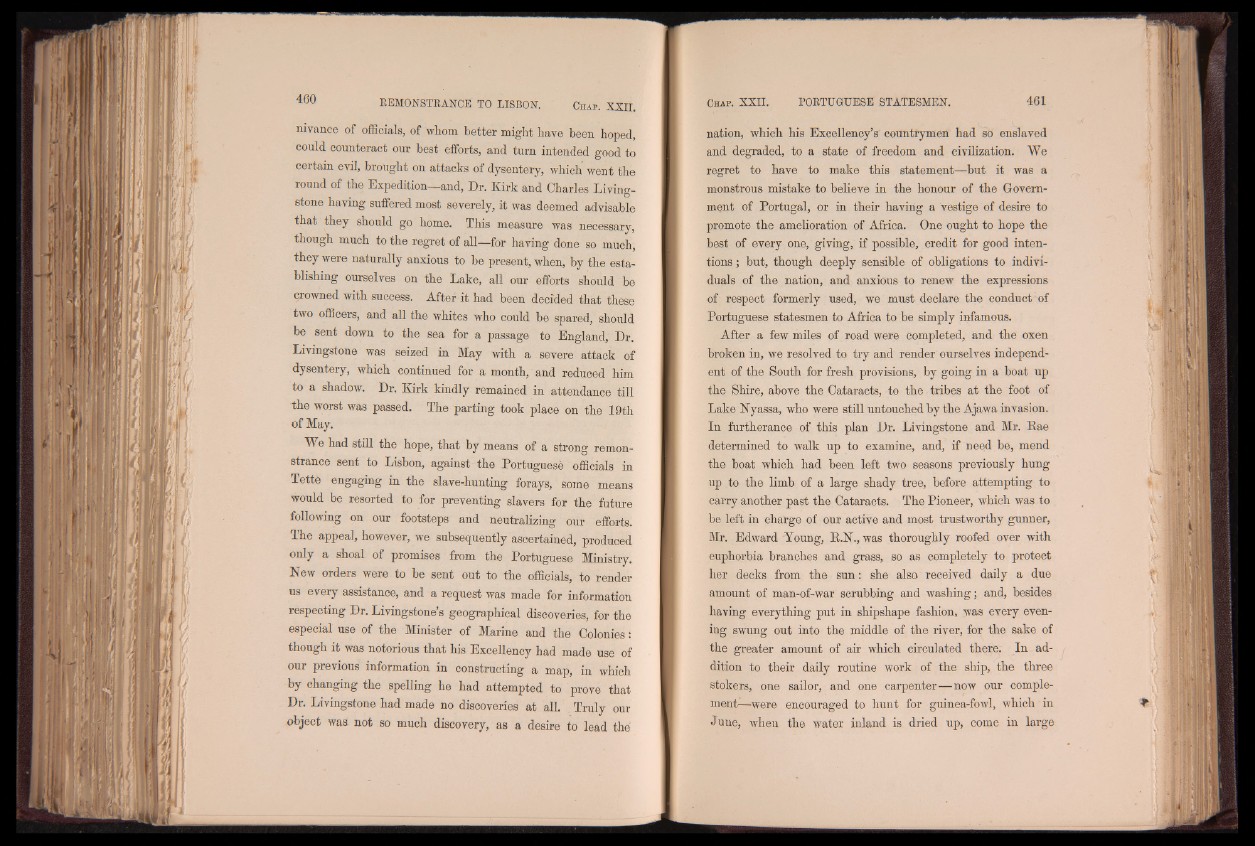
nivance of officials, of whom better might have been hoped,
could counteract our best efforts, and turn intended good to
certain evil, brought on attacks of dysentery, which went the
round of the Expedition—and, Dr. Kirk and Charles Livingstone
having suffered most severely, it was deemed advisable
that they should go home. This measure was necessary,
though much to the regret of all—for having done so much,
they were naturally anxious to be present, when, by the establishing
ourselves on the Lake, all our efforts should be
crowned with success. After it had been decided that these
two officers, and all the whites who could be spared, should
be sent down to the sea for a passage to England, Dr.
Livingstone was seized in May with a severe attack of
dysentery, which continued for a month, and reduced him
to a shadow. Dr. Kirk kindly remained in attendance till
the worst was passed. The parting took place on the 19th
of May.
We had still the hope, that by means of a strong remonstrance
sent to Lisbon, against the Portuguese officials in
Tette engaging in the slave-hunting forays, some means
would be resorted to for preventing slavers for the future
following on our footsteps and neutralizing our efforts.
The appeal, however, we subsequently ascertained, produced
only a shoal of promises from the Portuguese Ministry.
New orders were to be sent out to the officials, to render
us every assistance, and a request was made for information
respecting Dr. Livingstone’s geographical discoveries, for the
especial use of the Minister of Marine and the Colonies:
though it was notorious that his Excellency had made use of
our previous information in constructing a map, in which
by changing the spelling he had attempted to prove that
Dr. Livingstone had made no discoveries at all. Truly our
object was not so much discovery, as a desire to lead the
nation, which his Excellency’s countrymen had so enslaved
and degraded, to a state of freedom and civilization. We
regret to have to make this statement—but it was a
monstrous mistake to believe in the honour of the Government
of Portugal, or in their having a vestige of desire to
promote the amelioration of Africa. One ought to hope the
best of every one, giving, if possible, credit for good intentions
; but, though deeply sensible of obligations to individuals
of the nation, and anxious to renew the expressions
of respect formerly used, we must declare the conduct of
Portuguese statesmen to Africa to be simply infamous.
After a few miles of road were completed, and the oxen
broken in, we resolved to try and render ourselves independent
of the South for fresh provisions, by going in a boat up
the Shire, above the Cataracts, to the tribes at the foot of
Lake Nyassa, who were still untouched by the Ajawa invasion.
In furtherance of this plan Dr. Livingstone and Mr. Eae
determined to walk up to examine, and, if need be, mend
the boat which had been left two seasons previously hung
up to the limb of a large shady tree, before attempting to
carry another past the Cataracts. The Pioneer, which was to
be left in charge of our active and most trustworthy gunner,
Mr. Edward Young, R.N., was thoroughly roofed over with
euphorbia branches and grass, so as completely to protect
her decks from the sun: she also received daily a due
amount of man-of-war scrubbing and washing; and, besides
having everything put in shipshape fashion, was every evening
swung out into the middle of the river, for the sake of
the greater amount of air which circulated there. In addition
to their daily routine work of the ship, the three
stokers, one sailor, and one carpenter—now our complement—
were encouraged to hunt for guinea-fowl, which in
June, when the water inland is dried up, come in large